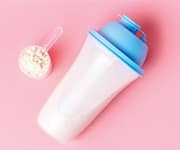Life Extension Magazine®
Discoveries continue to be made about the best nutrition, diet, or exercise regimens for athletes.
At the 19th annual International Society for Sports Nutrition (ISSN) conference in 2022, scientists, doctors, and other leaders in the field gathered to share the latest research on what might improve health and fitness.
This article will discuss some of the highlights.
Benefits of Fasted Cardio
There has long been debate about the merits of fastedvs.fed cardio, or whether to do aerobic exercise on an empty stomach or after eating.
Dr. Guillermo Escalante, DSc , Professor of Kinesiology at California State University-San Bernardino, has studied the benefits of each. He estimates that about 60% of top bodybuilding competitors do fasted cardio, ideally in the morning, theoretically as a way to burn more fat.
Fasted cardio (doing aerobic exercise after an overnight fast) may indeed be more efficient at burning fat because it helps break down triglycerides into fatty acids. It may also increase the ability of mitochondria to use oxygen to make energy, among other benefits.1
Dr. Escalante suggests that those who perform fasted cardio stick to low-to-moderate intensity workouts and do not exercise for more than 60 minutes due to potential loss of lean body mass.
Fasted exercise may also impede performance, which is why pre-exercise feeding is suggested for competitions. One way Dr. Escalante suggests potentially prolonging fasted exercise performance is to increase the percentage of calories you obtain from protein throughout the day.2
The Role of NAD+ in Muscle and Athletic Performance
NAD+ is a coenzyme found in every cell in the body, where it is crucial for facilitating energy production.3
Mounting evidence suggests that NAD+ plays an important role in muscle and athletic performance.
Mona Rosene, MS, RD, Global Director of Scientific Affairs at ChromaDex, discussed this relationship. ChromaDex was an innovator behind using theNAD+ precursor nicotinamide riboside to increase NAD+ levels.
Low NAD+ levels have resulted in sarcopenia (loss of muscle mass and strength) in mice, but replenishing NAD + restores muscle mass.4 In humans, even moderate resistance training was shown to significantly increase NAD+ levels in skeletal muscles.5
In a clinical study, older men received either 500 mg of nicotinamide riboside twice daily or a placebo. At 21 days, the treatment group had increased NAD+ metabolites in skeletal muscles, improved expression of muscle fiber protein genes, and lowered circulating levels of inflammatory cytokines. The placebo group was unchanged.6
In another clinical study, taking a different precursor from NAD +, nicotinamide mononucleotide, daily for six weeks improved aerobic capacity during exercise training. 7
What you need to know
The Latest Research from the ISSN Conference
- Fasted cardio may burn fat more efficiently than fed cardio.
- Boosting levels of the coenzyme NAD+ may improve exercise performance and muscle strength.
- The amino acid creatine, taken to build muscle mass, also improves some measures of cognitive performance.
- Increasing nitric oxide in the body improves some measures of exercise performance.
Creatine and Cognition
Dr. Scott Forbes, PhD, Professor in Physical Education Studies at Canada’s Brandon University, has conducted multiple clinical studies on creatine.
This amino acid is commonly taken to promote muscle growth, but an accumulation of evidence suggests that it also plays an important role in brain health.
Research shows:8
- Creatine is created primarily in the kidneys and liver, but can also be synthesized in the brain and has some ability to cross the blood-brain barrier.
- Creatine deficiency syndrome disorders can cause learning delays and seizures, but these disorders are at least partially reversed by oral creatine intake.
- Brain creatine levels are reduced following mild traumatic brain injury. In children with these injuries, creatine intake improves recovery in cognition, communication, self-care, and more.
- Creatine use improves choice reaction time, balance, and mood in sleep-deprived patients.
In a clinical study led by Dr. Forbes, female athletes who took 3 grams of creatine daily for 28 days had a small but positive improvement in reaction time, a measure of cognitive performance, compared to placebo.9
Creatine may support cognition, however additional studies are needed.10
Dr. Forbes also stressed creatine’s role in musclehealth and the importance of a creatine loading phase (taking 20 grams or more daily for 5-7 days before switching to the regular dosage of 5 grams or more daily) during the initial stages of a resistance training program.
Nitric Oxide Enhances Exercise
Dr. Andrew Jones, PhD, Professor of Applied Physiology at the U.K.’s University of Exeter, has closely studied the health benefits of the signaling molecule nitric oxide.
We need nitric oxide to control blood pressure and blood flow.11 Deficits of nitric oxide have been linked to exercise intolerance.12 Nitric oxide production is boosted in the body by consuming nitrates, nitrites, or the amino acid L-arginine, through diet or direct oral intake.11
In Dr. Jones’s clinical research, obtaining nitrates from beetroot juice:
- Enhanced tolerance of high-intensity exercise13 and
- Improved reaction time during intermittent sprint exercises.14
In a meta-analysis of 26 controlled trials, which included some of Dr. Jones’s work, nitrate intake decreased the amount of oxygen consumed during submaximal intensity exercise in healthy individuals.15 This means the amount of oxygen needed to perform the same exercise decreased, resulting in improved metabolic efficiency.
Obtaining nitrates or nitrites through processed meats can be harmful. But consuming vegetables high in nitrates or nitrites (such as lettuce, spinach, or beets) or taking the nitric oxide precursor L-arginine is associated with health benefits.16
Summary
The scientists, doctors, and researchers at the International Society of Sports Nutrition conference revealed discoveries about fitness and sports nutrition that can benefit the general population. •
If you have any questions on the scientific content of this article, please call a Life Extension Wellness Specialist at 1-866-864-3027.
References
- Escalante G, Barakat C. Fasted Versus Nonfasted Aerobic Exercise on Body Composition: Considerations for Physique Athletes. Strength & Conditioning Journal. 2020;42(5):71-8.
- Escalante G, Stevenson SW, Barakat C, et al. Peak week recommendations for bodybuilders: an evidence based approach. BMC Sports Sci Med Rehabil. 2021 Jun 13;13(1):68.
- Kulikova VA, Gromyko DV, Nikiforov AA. The Regulatory Role of NAD in Human and Animal Cells. Biochemistry (Mosc). 2018 Jul;83(7):800-12.
- Frederick DW, Loro E, Liu L, et al. Loss of NAD Homeostasis Leads to Progressive and Reversible Degeneration of Skeletal Muscle. Cell Metab. 2016 Aug 9;24(2):269-82.
- Lamb DA, Moore JH, Mesquita PHC, et al. Resistance training increases muscle NAD(+) and NADH concentrations as well as NAMPT protein levels and global sirtuin activity in middle-aged, overweight, untrained individuals. Aging (Albany NY). 2020 May 5;12(10):9447-60.
- Elhassan YS, Kluckova K, Fletcher RS, et al. Nicotinamide Riboside Augments the Aged Human Skeletal Muscle NAD(+) Metabolome and Induces Transcriptomic and Anti-inflammatory Signatures. Cell Rep. 2019 Aug 13;28(7):1717-28 e6.
- Liao B, Zhao Y, Wang D, et al. Nicotinamide mononucleotide supplementation enhances aerobic capacity in amateur runners: a randomized, double-blind study. J Int Soc Sports Nutr. 2021 Jul 8;18(1):54.
- Forbes SC, Cordingley DM, Cornish SM, et al. Effects of Creatine Supplementation on Brain Function and Health. Nutrients. 2022 Feb 22;14(5):921.
- Pires LA, Forbes SC, Candow DG, et al. Creatine supplementation on cognitive performance following exercise in female Muay Thai athletes. NeuroSports. 2021;1(1):6.
- Avgerinos KI, Spyrou N, Bougioukas KI, et al. Effects of creatine supplementation on cognitive function of healthy individuals: A systematic review of randomized controlled trials. Exp Gerontol. 2018 Jul 15;108:166-73.
- Jones AM, Vanhatalo A, Seals DR, et al. Dietary Nitrate and Nitric Oxide Metabolism: Mouth, Circulation, Skeletal Muscle, and Exercise Performance. Med Sci Sports Exerc. 2021 Feb 1;53(2):280-94.
- Dyakova EY, Kapilevich LV, Shylko VG, et al. Physical exercise associated with NO production: signaling pathways and significance in health and disease. Front Cell Dev Biol. 2015;3:19.
- Bailey SJ, Winyard P, Vanhatalo A, et al. Dietary nitrate supplementation reduces the O2 cost of low-intensity exercise and enhances tolerance to high-intensity exercise in humans. J Appl Physiol (1985). 2009 Oct;107(4):1144-55.
- Thompson C, Vanhatalo A, Jell H, et al. Dietary nitrate supplementation improves sprint and high-intensity intermittent running performance. Nitric Oxide. 2016 Dec 30;61:55-61.
- Pawlak-Chaouch M, Boissiere J, Gamelin FX, et al. Effect of dietary nitrate supplementation on metabolic rate during rest and exercise in human: A systematic review and a meta-analysis. Nitric Oxide. 2016 Feb 29;53:65-76.
- Karwowska M, Kononiuk A. Nitrates/Nitrites in Food-Risk for Nitrosative Stress and Benefits. Antioxidants (Basel). 2020 Mar 16;9(3).




